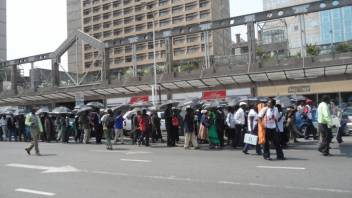 On the first day of October, the bright early morning sun promised an oppressively hot day in Harare, Zimbabwe.
On the first day of October, the bright early morning sun promised an oppressively hot day in Harare, Zimbabwe.
A crowd of people gathered at the African Unity Square in the heart of the city and right opposite the country’s parliament.
This was not your usual crowd though; it was a gathering of older people, some too frail to walk. A sense of comradeship and enthusiasm filled the square as the growing crowd got ready to mark the day, the UN International Day of Older Persons (IDOP).
Challenges of being older in Zimbabwe
As I chatted to the older men and women, I realised how much the IDOP 2014 theme, “Leaving No One Behind: Promoting a Society for All”, resonated with their daily lives.
Older people in Zimbabwe, estimated to be 760,000 or 5.8% of the population, face serious challenges including fragile livelihoods, weak social security support, poor access to health and care services and violence and abuse (particularly regarding older women’s right to inheritance).
The recent economic turmoil including hyperinflation has further weakened communities and family-level arrangements for caring and supporting older people. In the absence of a universal pension scheme, the economic meltdown has left older people struggling to survive. Even among the small number of people with contributory pensions, the collapse of the local currency has severely de-valued how much they have to survive on.
Healthcare system under strain
The public healthcare system can barely meet the needs of the population due to the lack of investment and the burden of communicable and non-communicable diseases, including HIV and AIDS. This situation has left older people unable to access essential health and care services.
Despite the Older Person’s Act having been enacted in 2012, there has been little government budgetary allocation to implement the law.
Back at the African Unity Square, the energised crowd, numbering over 200 older people, set off for a march on the streets of Harare chanting, carrying banners and distributing leaflets all calling for action to address the predicaments they face.
The procession headed to the City Hall where the main event, under the banner of the Age Demands Action Campaign took place.
Older campaigners took action
Once there and having secured the attention of government officials, politicians and the media, the older delegation laid out their demands, which included:
- the restitution of the contributory pension fund
- a universal pension scheme for older people
- an improved access to health services, particularly geriatric and palliative care
- an age-inclusive HIV and AIDS care programme
- enhanced law enforcement to address violence and abuse of older people.
Judging from the nods and the claps, the messages seemed to hit home. After the event, older people returned to their homes, hopeful that their pleas find a place in the country’s development agenda.
In the meantime, the push continues.
“It is going to be a long journey, but we are prepared, whatever it takes,” remarked Marck Chikanza, the Coordinator of the National Ageing Net.
Find out more about our Age Demands Action campaign.
